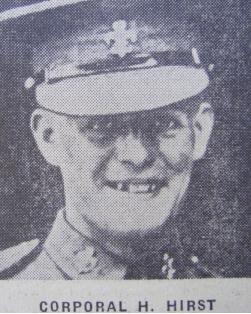 Sergeant
Harry Hirst,
Sergeant
Harry Hirst,
Manchester Regiment
The Burnley Express of 3 February 1945 p7 reported that:
RESCUED FROM JAPS
BURNLEY SERGEANT'S THREE YEARS IN LUZON
After one of the most exciting operations of the Pacific War,
500 prisoners of war on Luzon Island in the Philippines have been rescued in
a raid on a Jap prison camp 25 miles behind the front line by United States
Commandos.
The rescued men, who were mostly Americans, included Sergt. Harry Hirst, 53,
Grey Street, Burnley, who was taken prisoner at the capitulation of Singapore,
while serving with the Manchester Regiment. The eldest of the four sons of Mr.
and Mrs. H. Hirst, he joined the Manchesters in 1938 after previously serving
in the Gordon Highlanders. He went overseas with the regiment and assisted in
the fighting for Singapore.
As a boy, Sergt. Hirst attended Abel Street School, and later was employed at
Burnley Co-operative Society's dairy for a time. He also worked as a clerk for
Messrs. Riley, Crossley and Knowles, of Grimshaw Street, before deciding to
become a regular soldier at the age of 17.
His mother Mrs. Ada Hirst, told an "Express" reporter: "We heard
nothing of him for two years after Singapore and then in July, 1943, we got
a card saying he was in No. 2 Thailand camp and quite well. We've had occasional
cards from him since, the last at Christmas time".
Mrs. Hirst had just heard the wireless announcement of the raid when our reporter
called with the news that her son was among the rescued men. She did not connect
the raid with him, however as she did not know he was in the Philippines.
Interviewed by war correspondents after the raid, Sergt. Hirst said the prisoners
were frequently beaten savagely for trivial offences such as stopping work for
a moment. The favourite form of punishment was to compel prisoners to stand
rigid in the sun holding shovels above their heads for hours until they collapsed.
The food consisted principally of watery rice gruel and sweet potatoes with
occasionally inferior bread, scraps of fish and a small piece of buffalo meat
every two or three weeks.
Many of the rescued men were in a weak state, clad only in patched underwear
and suffering from malnutrition. Most of the British were survivors of a prison
ship which was sunk last December. All are now being cared for in a U.S. hospital,
and the official announcement from General MacArthur stated that their condition
was fair.